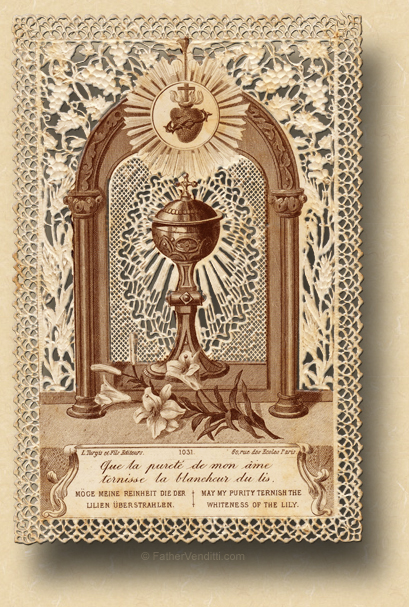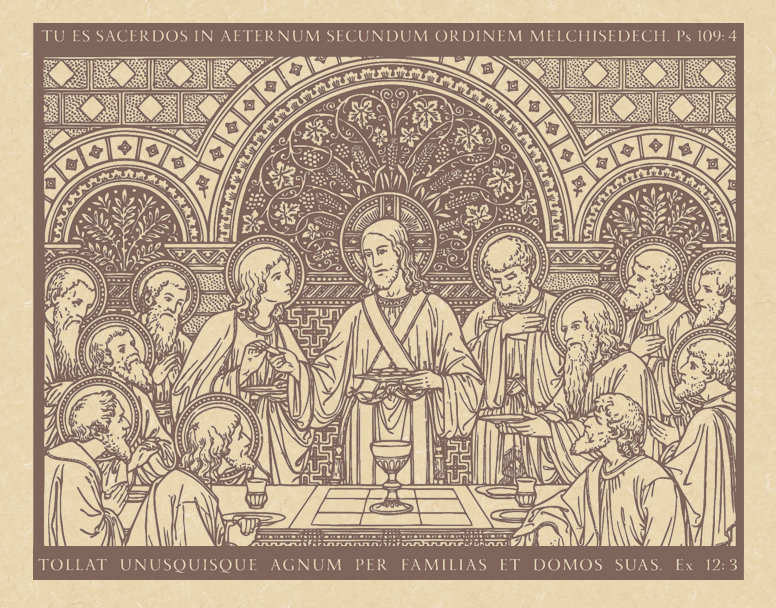All Employees Must Wash their Hands…
The Twenty-Eighth Tuesday of Ordinary Time; or, the Memorial of Saint John XXIII, Pope.
Lessons from the secondary feria, according to the ordinary form of the Roman Rite:
• Galatians 5: 1-6.
• Psalm 119: 41, 43-45, 47-48.
• Luke 11: 37-41.
|
When a Mass for the memorial is taken, lessons from the feria as above, or any lessons from the common of Pastors for a Pope. As this memorial is new to the Church, proper lessons have yet to be indicated.
|
The Second Class Feast of the Motherhood of the Blessed Virgin Mary.*
Lessons from the proper, according to the extraordinary form of the Roman Rite:
• Ecclesiasticus 24: 23-31.
• [Gradual] Isaiah 11: 1-2.
• Luke 2: 43-51.
The Twenty-First Tuesday after Pentecost; the Feast of the Holy Apostle Philip, One of the Seven Deacons; the Feast of Our Venerable Father Theophane the Artist & Hymnographer, Bishop of Nicea; and, the Feast of Our Holy Father John XXIII, Pope of Rome.**
First & third lessons from the pentecostarion, second & fourth from the menaion for the Apostle, according to the Ruthenian recension of the Byzantine Rite:
• Colossians 2: 20—3: 3.
• Acts 8: 26-39.
• Luke 8: 1-3.
• Luke 10: 1-15.
FatherVenditti.com
|
 1:03 PM 10/11/2016 — Helpful to reading the Holy Gospels with understanding is knowing the target audience, knowing to whom each of the four Evangelists directed his work. The Gospels are the Word of God, but in the words of men, and those men each had their own purpose in setting pen to parchment. That's why the four Gospels are not the same. Matthew and Luke wrote their accounts of the life of our Lord to their fellow Jews, so there's a lot about Jewish life left unexplained because the target audience wouldn't have needed those explanations. John's Gospel is a mystical work that doesn't really try to explain anything except the eternal realities, and his target audience is everyone. The Gospel of the Blessed Apostle Mark is unique because it's directed primarily to pagan converts to Christianity who knew nothing of Jewish habits and customs, and would therefore have to have these things explained to them. 1:03 PM 10/11/2016 — Helpful to reading the Holy Gospels with understanding is knowing the target audience, knowing to whom each of the four Evangelists directed his work. The Gospels are the Word of God, but in the words of men, and those men each had their own purpose in setting pen to parchment. That's why the four Gospels are not the same. Matthew and Luke wrote their accounts of the life of our Lord to their fellow Jews, so there's a lot about Jewish life left unexplained because the target audience wouldn't have needed those explanations. John's Gospel is a mystical work that doesn't really try to explain anything except the eternal realities, and his target audience is everyone. The Gospel of the Blessed Apostle Mark is unique because it's directed primarily to pagan converts to Christianity who knew nothing of Jewish habits and customs, and would therefore have to have these things explained to them.
So, when we read in today’s Gospel lesson, which is from Luke, about how upset the Pharisees are that our Lord sat down to eat without washing, giving rise to His lecture to them about hypocrisy, we need more information to understand it correctly, because Luke is presuming we know things that we don’t know. Thankfully, Saint Mark has also recorded this event, and inserts the following marginalia into the narrative, which Luke presumes his readers to already know:
For the Pharisees, and indeed all the Jews, holding to the tradition of their ancestors, never eat without washing their hands again and again; they will not sit down to meat, coming from the market, without thorough cleansing; and there are many other customs which they hold to by tradition, purifying of cups and pitchers and pans and beds (Mark 7: 3-4 Knox).
Mark includes this little explanation because without this information it would be difficult for the Christian coming from paganism to understand why the Pharisees are so upset with our Lord not going through this ritualistic routine before eating. But even for ourselves it helps us to understand better what the criticism is, because the Pharisees are not working for the public health department;—they're not concerned that our Lord is going to get sick because He’s not washing His hands before meals—they are concerned because these various washings were part of a religious purification ritual which has it's roots in the Book of Deuteronomy, not a concern for hygiene.
Of course, like many of the traditions that the Pharisees embraced, their original meaning had already been forgotten even in our Lord's time; the Pharisees, concerned only with tradition for tradition's sake, completely forgot that these purification rituals were originally used as part of the liturgical rite for the entrance of the priest into the sanctuary of the Temple in Jerusalem. The Pharisees, whom you may remember from a previous homily a long time ago, pioneered the invention of the Synagog so that Jews wouldn't have to necessarily go to the Temple to worship; and, they simply transplanted this ritual to the beginning of every meal. And on the surface it seems that our Lord is simply reminding them—and us—of the need for our liturgical actions to be authentic, to not let a blind adherence to tradition be an end unto itself, but that it must reflect something real and genuine. And that is true.
But if we dare dig a little deeper, we find there's more to it than that. In the original rite by which the Jewish priest entered the sanctuary of the Temple, the hymn that was sung by the people was Psalm 24: “Who shall ascend the hill of the Lord? And who shall stand in his holy place? He who has clean hands and a pure heart (vs. 3-4 NABRE). And if you were to review all of the liturgical proscriptions of Deuteronomy regarding worship in the Temple, you find that purity of heart appears continually as the one necessary condition for approaching God and being able to behold His face. The problem for the Pharisees of our Lord's time is that they hadn't gotten beyond the purely external level, and even had added to the intricacy of the rite, while neglecting its fundamental aspect, namely, cleanliness of heart, of which all the rest was merely a sign and a symbol.***
This is the reason why our Lord reacts so strongly to their criticism and denounces them as hypocrites: “And the Lord said to him, You Pharisees are content to cleanse the outward part of cup and dish, while all within is running with avarice and wickedness.” (Luke 11: 39 Knox). He's not talking about how the Pharisees perform their kitchen duties. Saint Mark, again, provides the complete text of our Lord’s rebuke:
For it is from within, from the hearts of men, that their wicked designs come, their sins of adultery, fornication, murder, theft, covetousness, malice, deceit, lasciviousness, envy, blasphemy, pride and folly. All these evils come from within, and it is these which make a man unclean (7: 21-23 Knox).
That's quite an examination of conscience our Lord provides, and one which we could use ourselves in preparing for confession. And it certainly wouldn't hurt in anticipation of receiving our Blessed Lord in Holy Communion.
And it provides for us the perfect opportunity to reflect on our own attention to purity, both purity of heart and purity of body, whenever we presume to approach our Lord for Holy Communion. People visiting our Shrine for the first time are sometimes taken aback by the manner by which we like to distribute Holy Communion here: we provide kneelers for those who wish to receive kneeling; and, when people approach to receive in the hand but without their hands being held in the proper manner, I will not place the Sacred Host in their hands but put it in their months, not because I have any problem with people who receive in the hand, but because it's necessary to do it in the proper way. We do this because the Blessed Eucharist is our Lord. The act of receiving Holy Communion at Mass can become so routine, sometimes we can do it without even thinking. But by giving such attention to the proper distribution and reception of Holy Communion, our hope is to inspire people to give more thought to it, and perhaps even stop to consider whether they should receive that day.
Let us turn, then, to the Mother of God, who was full of grace from the first moment of Her conception, made pure by God so that She could bring us our Lord, inspiring us to seek out His penance so that we can be just as pure in receiving Him.

* In 1931, Pope Pius XI instituted this feast to commemorate the fifteenth centenary of the Council of Ephesus, held in the year 431, which vindicated the title of Theotokos or "Mother of God" for our Lady. In the oridnary form, it has been transfered to January 1st and promoted to the rank of a solemnity, displacing the old feast of the Circumcision.
** The holy deacon Philip was born in Cæsarea of Palestine. According to Acts, he was one of the seven deacons ordained by the apostles. He preached in Samaria, baptized Simon the Magician, explained the faith to the Eunuch of Queen Candace of Ethiopia and baptized him. His four daughters were gifted with the charisma of prophesy.
Theophane the Hymnographer (778-845) was a brother of Theodore the Confessor. Both were born in Karak of Transjordan. Highly educated in science, they entered the monastic life in 800 and were ordained to the priesthood. They moved to Constantinople in 813 and, under the inconoclastic Emperor Leo the Armenian, were jailed for their faith. Released by order of the Emperor Michael the Stutterer, they were arrested again by Emperor Theophilus, sent into exile in 834, then called back to the capital where they were beaten and branded on the forehead. Finally, during the reign of the pious Emperor Michael (not to be confused with the previosly mentioned), Theophane become Metropolitan Archbishop of Nicea, and died in 845.
*** Cf. St. John Paul II, General Audience, Dec. 10, 1980.
|

